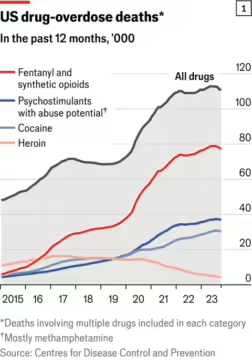Sunday, 8 June 2025
Tiny Countries Should Not Exist
Friday, 27 December 2024
Billionaires Are Not As Rich As We And They Like To Pretend
 |
| The Scrooge McDuck model of obscene wealth, as propagated by inequality activists |
Thursday, 17 October 2024
Hard Drugs Have Become Too Dangerous Not To Legalise
Republished on my substack
Drug overdose deaths have more than doubled in America in the past 10 years, mainly due to the appearance of Fentanyl and other synthetic opioids. These drugs combine incredible ease of manufacture with potency in tiny amounts and dangerousness (the tiniest miscalculation in dosage makes them deadly).This continues a general and no longer surprising trend. The global war on drugs has produced a strong selection effect for drugs which are easy to manufacture and smuggle but at the cost of being much more dangerous for consumers. There is no reason to expect this trend to alter. Moreover, Fentanyl leaks – it appears as an additive in all sorts of other illegally bought drugs, like Xanax, surprising and killing consumers who had no idea what they were getting.
The best thing we can do about this – and hence the right thing to do – is to legalise all hard drugs so that consumers have a real choice about the dangers they subject themselves to.
Wednesday, 10 January 2024
Americans Are Not As Poor As They Think They Are
Monday, 3 April 2023
Governments Don't Actually Prioritise Economic Growth - But They Should
Sunday, 23 October 2022
How Many Children's Lives Is That Worth?
Take the median of the GiveWell figures: $4,000. I propose that prices for all goods and services should be listed in the universal alternative currency of percentage of a Child’s Life Not Saved (%CLNS), as well as their regular prices in Euros, dollars, or whatever. For example, a Starbucks Frappucino might be priced at 5$ /0.13%CLNS. A Caribbean holiday cruise might be priced at $8,000/ 200%CLNS (perhaps written as emojis🪦🪦)
Sunday, 3 July 2022
To Solve The Global Food Crisis We Must First Stop Fixating On Putin
Saturday, 11 June 2022
No, Poor Countries Shouldn't Try To Make Their Own Covid Vaccines
 |
| Source: UNDP |
Monday, 2 May 2022
Just End Poverty Now: The Case for a Global Basic Income
[An updated version of this essay, accounting for changes in statistics since 1st publication, appears on my Substack]
According to the World Bank’s latest figures, around 700 million people live in utter destitution, on less than $1.90 per day, poorer than the average pet cat in the rich world. It is easy to agree that this is a terrible thing. It has so far been much harder – even for philosophers – to agree on what should be done about it. Peter Singer, for example, argues that rich people should donate more to effective charities. Thomas Pogge argues that rich world citizens should stop their governments from supporting less than ideally just global institutions. Yet this intellectual debate is an unnecessary distraction. We already have all the moral agreement we need to act. Ending extreme poverty is not an intellectual problem but a practical one, and not even a particularly difficult one. We just need to find the people who are poor and give them enough money so that they aren’t poor anymore.
Monday, 18 April 2022
Why Governments Failed the Challenge of Covid and Capitalism Succeeded
- Corporations are better at globalisation than national governments
- Political incentives are less well aligned with the public interest than those for corporations
Monday, 23 August 2021
The Political Economy of Tourism
I think some of this resentment is entirely misplaced, and other parts are misdirected. The central problem is a failure to recognise that tourism is an export industry. Your country exports things like cars or T-shirts or coffee beans to people in other countries in exchange for tokens (dollars, Euros, etc) that you can use to buy things they make. Tourism is where you sell foreigners things that can't be moved around the world; things that they have to come to your country to consume, like views of your beautiful coastline, authentic cuisine, and the famous paintings in your museums. The fact that cars and T-shirts tend to get made inside large ugly buildings on the outside of town while tourism exports are produced in the prettiest parts of the centre is irrelevant. The things that tourists buy are still exports.
Wednesday, 18 August 2021
The Moral Case for Guest Worker Programmes
Friday, 26 March 2021
Why Are Moral Philosophers So Bad At Global Justice?
Sunday, 3 January 2021
Racism Is Global and Local - But Not Especially American
Tuesday, 15 December 2020
Boris Johnson's Peculiar Game of Kamikaze Chicken is About to End
Sunday, 28 April 2019
What Kind of Jobs Will the Robots Leave Us?
 |
| Coming for your job! |
Sunday, 16 September 2018
Invisible Hand Ethics
"[B]y directing that industry in such a manner as its produce may be of the greatest value, he intends only his own gain, and he is in this, as in many other cases, led by an invisible hand to promote an end which was no part of his intention….By pursuing his own interest he frequently promotes that of the society more effectually than when he really intends to promote it. I have never known much good done by those who affected to trade for the public good." (Adam Smith, The Wealth of Nations, IV.2.9)











